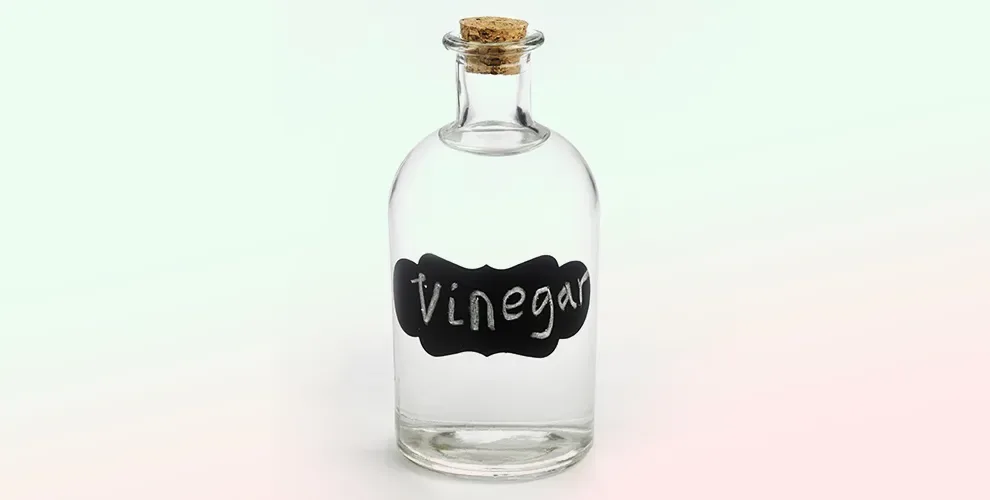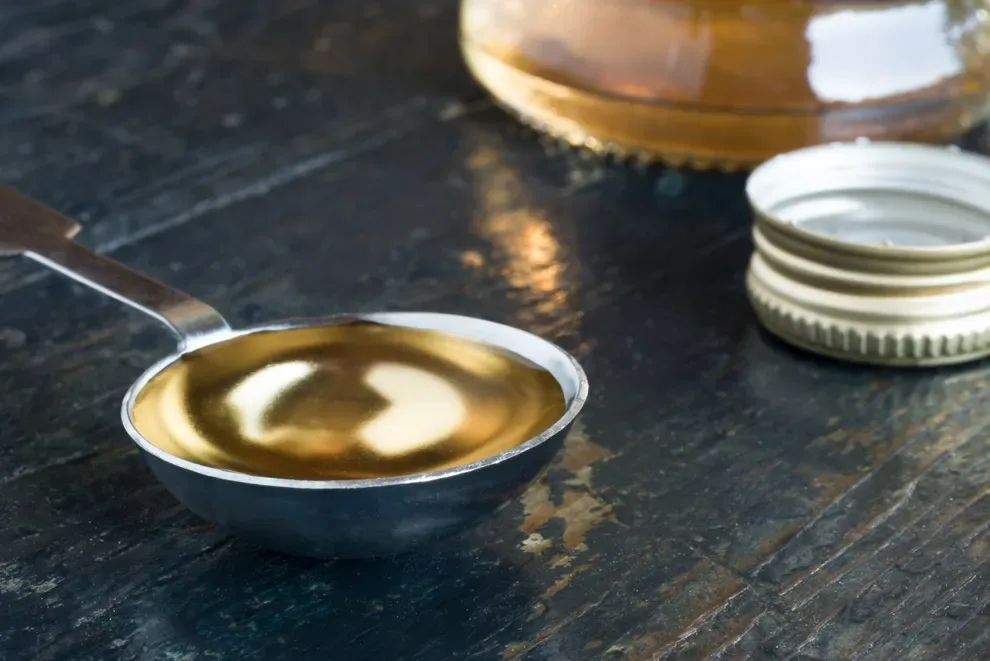Vinegar for White Teeth: Does Science Support the Method?

Table of Contents
- How You Whiten with Vinegar
- Vinegar Whitening Damage
- Whitening Teeth with White Vinegar
- How Whitening with Vinegar Causes Damage
- Alternatives to Vinegar
- References
Vinegar is known as a cure-all among natural remedy seekers, with a long tradition of use for health and household purposes. Recently, it’s even gotten some attention from beauty bloggers and the like for its potential as a teeth whitener.
Yes, vinegar can whiten and brighten teeth. Vinegar is an extremely acidic substance. Apple cider vinegar, for example, has a PH of 2.4. Acids can destroy some of the stain molecules on teeth to reveal a whiter smile.
But whitening your teeth with vinegar isn’t safe. It can result in tooth enamel damage and, ultimately, more yellow-looking teeth.
The same acidity that provides whitening will also wear away on tooth enamel. Continually whitening your teeth with vinegar (or any abrasive substance) will lead to your teeth thinning.
Eventually, your enamel may become so worn down as to show shades of your dentin (the inner tissue that forms most of your tooth). Dentin has a yellowish tone. The more it’s revealed, the more your teeth will look yellow or brown.
How Do You Whiten with Vinegar?
Apple cider vinegar has become the darling of beauty bloggers around the world. A quick online search brings back hundreds of articles about how this liquid can brighten skin, ease digestive distress, and make hair gleam. Bloggers also say that the substance can brighten teeth. Typically, they recommend the following:
Brushing with vinegar: Instead of using plain water for your daily toothbrushing regime, you'll use vinegar.
Rinsing with vinegar: If mixing minty paste with vinegar doesn't seem appealing, you might be encouraged to swirl the stuff around your teeth when brushing is done.
Creating a paste: Some bloggers recommend mixing vinegar with baking soda and applying that paste to your teeth.
Drinking vinegar: Some claim that a sip or two of vinegar can brighten teeth while offering other health benefits.
Some research indicates that apple cider vinegar can whiten teeth. In one study of cow's teeth, researchers found that apple cider vinegar was as effective as hydrogen peroxide in bleaching and whitening teeth.But studies like this can be misleading. Researchers are working with teeth no longer connected to underlying structures, like blood vessels and gums. It's hard to know if the results seen in a lab are the same as those you see in a mirror.Researchers also can't determine if these non-live teeth are damaged after vinegar treatment.
Beauty bloggers swear that vinegar can whiten teeth safely, but experts don't agree because vinegar is acidic, and it can damage your teeth.
Whitening your Teeth with Vinegar can Cause Damage
The two main types of vinegar sometimes suggested for teeth whitening are apple cider vinegar and white vinegar. There are differences between these two vinegars and how they may affect teeth.
Whitening Teeth with Apple Cider Vinegar
Apple cider vinegar is a natural and fermented product. One of the most well-known brands of apple cider vinegar, Bragg, explains the process of making organic apple cider vinegar on their website:
Organic non-seeded and unpeeled apples are crushed into apple juice.
With the bacteria and sugar from the apples, the apple juice is fermented into ethanol.
The now-alcoholic apple juice is fermented again. This time the alcohol is converted to acetic acid. The vinegar “mother” is formed, which contains “good” bacteria and enzymes. Many apple cider vinegars are sold with the mother in the bottle.
Water is added, diluting the vinegar to a 5% acidity.
Apple cider vinegar is fermented apple juice, and the final product has an average pH between 2.5 and 3, experts say. Fluids like this are classified as an acid. Prolonged contact with your teeth and an acidic compound like apple cider vinegar can dissolve the enamel of your teeth and cause tooth decay.
While using apple cider vinegar for whitening purposes can be counterproductive and damaging to your teeth, some still believe it’s a product that can promote oral health. Some dentists still advise its use for toothaches, and research shows It may be effective in reducing plaque and gingivitis. Still, its effect on the enamel must be considered when using it even in moderation.

Whitening Teeth with White Vinegar
Just like with apple cider vinegar, white vinegar is also an acidic product, and it can cause even more damage to your teeth than apple cider vinegar (if regular, not distilled, white vinegar is used).
White vinegar is made with grain alcohol. Oxygen is mixed into the alcohol to ferment it, creating bacteria and acetic acid. Unlike apple cider vinegar, there is no live “mother.”
Culinary recipes may call for distilled white vinegar. This is white vinegar that has been diluted to 5% (the same as apple cider vinegar).
For cleaning purposes, regular (non-distilled) white vinegar is often used. This may have an acidity of up to 25% and should never be ingested or used on teeth.
Like apple cider vinegar, white vinegar is acidic. It will remove some stains and brighten teeth because of its acidity, but it will also damage the enamel of your teeth.
And while apple cider vinegar is known for its health benefits and contains live cultures, white vinegar is mainly used in cleaning. It has not been shown to reduce plaque.
How Whitening your Teeth with Vinegar Causes Damage
While vinegar can effectively change the color and whiten your teeth, it can also make them softer by eating away the hard outer layer (the enamel).
Exposure to vinegar can soften your teeth more quickly and cause more erosion to the enamel in a shorter amount of time. Eroded enamel can increase your risk for tooth decay and cavities.
The damage doesn't stop with your teeth. Experts say too much vinegar can also harm the following:
Intestines
Skeleton
Throat
Skin
Whether you drink it, swill it, or apply it topically, vinegar can do a lot of damage to vital structures. It's not a safe product to use liberally.
Teeth in acidic environments move through a process called leaching. Vital minerals leave the solid part of the teeth, and they bleed into the surrounding liquids. Holes appear within the teeth, and they grow with time. Keep applying acids, and the teeth will disintegrate.You may not notice the damage at first. But in time, your teeth might seem more painful or sensitive.Your teeth do best in a neutral environment, dentists explain, and your body is well equipped to supply it. If you take in something acidic, like a fruity snack, your saliva will undo the damage quickly. But bombard your body with endless acidity, as you would if trying to whiten teeth, and damage will appear. So, if you brush your teeth with apple cider vinegar, for example, the acid stays on your teeth for longer than when you eat something acidic, which can erode the enamel.
Other Ways to Brighten your Smile
The internet is filled with articles about how to brighten your smile with natural products. From baking soda to vinegar to lemon juice, people are looking for ways to make their whites bright without getting an expert's help. The American Dental Association recommends these at-home tooth-whitening steps:
Brush your teeth. Aim for a 2-minute brushing session twice every day.
Choose the right product. A whitening toothpaste can be helpful.
Floss your teeth. Carefully floss between your teeth every day to remove trapped food and reduce decay.
Avoid stains. Don't smoke, and limit your intake of coffee, tea, and red wine.
Visit your dentist. Regular cleanings could stop plaque from building, and that could keep your teeth whiter.
But if these steps don't help, a dentist might have a good solution. For example, if you're working with a dental expert on straighter teeth, you could have the tools you need in your home. Teeth aligners slide onto your teeth and gently push them into proper positions. They also cover your teeth from root to tip. Filling those trays with a whitening solution could help you bleach out impurities and whiten your smile as you straighten your teeth.It's critical to stick to products your team recommends. Some over-the-counter products can harm your aligners. But if your team gives you a whitening product, this could be just what you need to make your teeth whiter safely.
